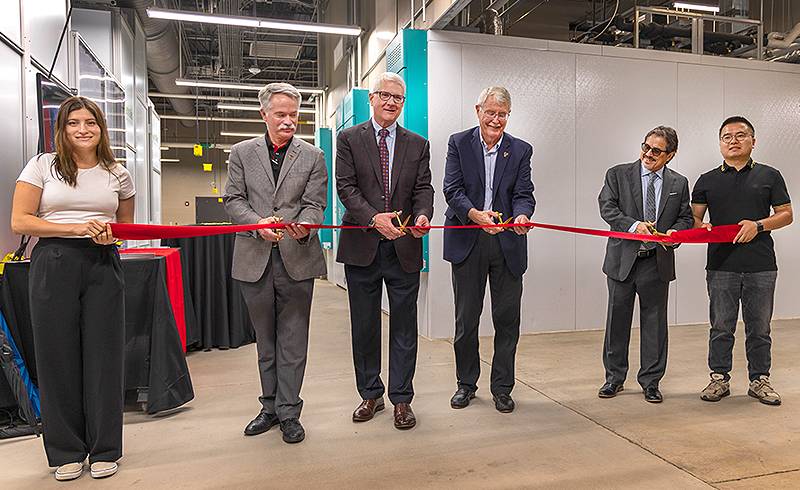
A cutting-edge, agricultural-oriented research team from Texas Tech University’s Davis
College of Agricultural Sciences & Natural Resources today (June 5) celebrated the
installation of a new phenotyping machine, one of only three of its kind in the world
and the only one custom-built for the Department of Plant & Soil Science.

Housed in the department’s Institute of Genomics for Crop Abiotic Stress Tolerance
(IGCAST), the new equipment is designed to capture high-resolution plant images. Located in
IGCAST’s Phytotron – home to three greenhouses and five growth chambers – the new
machine will rapidly and accurately differentiate phenotypes, or physical traits,
in crops.
This advanced imaging capability allows researchers to study plant responses to stressors
like drought, wind and heat with unprecedented speed and precision, according to IGCAST
Director and President’s Distinguished Professor of Plant Genomics Luis Rafael Herrera-Estrella.
By shortening the time needed to analyze phenotype reactions, he said, the machine
significantly accelerates the breeding and evaluation of new seed varieties. For producers,
this innovation translates to faster development of crops with higher yield potential
and lower input needs – advancing agricultural resilience despite challenging conditions.
Davis College’s Department of Plant & Soil Science Chair Glen Ritchie noted that the phenotyping system combines state-of-the-art hyperspectral and other
imaging with advanced analysis algorithms to measure the ways plants respond to specific
abiotic stresses and called it a game-changer for plant selection.
The newly customized LemnaTec system (PhenoAIxpert HT) enables researchers to examine plant growth and development, plant-microbe interactions,
soil biology and environmental stress responses through non-destructive, large-scale
and seamless workflows, added Davis College Associate Dean for Research Noureddine Abidi.
The system allows for comprehensive measurement of plant growth and development, shape,
biomass, water content, water consumption and evaporation, leaf and plant temperature,
soil and pot temperature, biochemical properties, yield and photosynthetic performance,
he said.
“This new investment plays a critical role in meeting the strategic vision of IGCAST
and Davis College’s research mission, not only through research opportunities, but
through the recruitment and retention of excellent researchers and training of graduate
students,” said Davis College Associate Dean for Strategic Initiatives & Assessment
Darren Hudson. “The new investment will also leverage and expand the nationally leading reputation
of IGCAST in the area of genomics.”
Led by Herrera-Estrella, the high-profile, 50-member IGCAST research group examines
how plants adapt to thrive in the presence of environmental stresses such as extreme
heat and cold, drought and in the presence of brackish water sources. One of the foremost
plant molecular biologists in the world and Texas Tech’s first National Academy of
Sciences member, Herrera-Estrella is a pioneer in the development of plant genetic
engineering. He joined the Texas Tech faculty in 2018.
Herrera-Estrella’s arrival at Texas Tech was made possible by a $5 million grant from
the State of Texas Governor's University Research Initiative and matched by the university
to bring the best and brightest researchers to Texas. IGCAST itself was established
in 2020 with a mission of conducting top-ranked research and graduate education on
the use of functional and population genomics to understand the molecular mechanisms
that determine resilience of crops and related wild species to adverse environmental
stresses.
CONTACT: Glen Ritchie, Department Chair, Department of Plant & Soil Science, Texas Tech University at (806) 742-4325 or glen.ritchie@ttu.edu
0605NM25 / PHOHO: KADYN COLLINS
